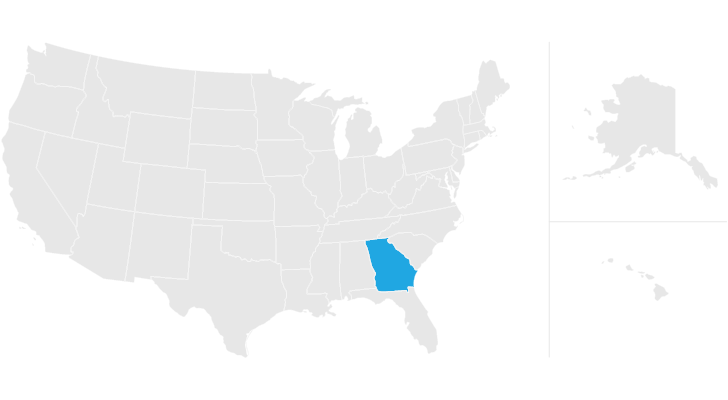
There is no estate tax in Georgia. If you’re estate planning, there are still other factors to consider, like the possibility of having to pay the federal estate tax. If you’re dealing with an estate or with any other financial planning situation, you might want to consider finding a financial advisor who can help. Try using SmartAsset’s free financial advisor matching tool to start.
Georgia Estate Tax
Georgis is one of 38 states with no estate tax.
What Is the Estate Tax?
The estate tax is a tax levied by the federal government and some local governments on the estate of a recently deceased person. It is sometimes called the “death tax.” The estate tax is applied before the people inheriting the money receive it.
The estate tax is different from the inheritance tax. Inheritance taxes are applied to a person’s heirs after they have already received money from someone who recently died.
Georgia Inheritance Tax and Gift Tax

There is no inheritance tax in Georgia. Another state’s inheritance tax could still apply to Georgia residents, though. For instance, in Pennsylvania, the inheritance tax applies to heirs who live out of state if the decedent lives in the Keystone State. Check local laws to see if this might apply to you.
Georgia also has no gift tax. The federal gift tax has an exemption of $18,000 per recipient for 2024 and $17,000 for 2023. Gifts over that total to one person in a single year count against your 2024 lifetime exemption of $13.61 million.
Federal Estate Tax
Even though there is no state estate tax in Georgia, you may still owe money to the federal government. The federal estate tax exemption is $13.61 million in 2024, up from $12.92 million for 2023. This tax is portable for married couples, meaning that if the right legal steps are taken a married couple’s estate won’t have to pay a tax on up to $27.22 million when both spouses die.
If an estate tax exceeds that amount, the top federal tax rate is 40%. A full chart of federal estate tax rates is below.
Here’s an example of how it works: Let’s say your estate is worth $15.55 million and you aren’t married. To determine the total estate tax burden, you’ll first need to subtract the $13.61 million exemption, leaving a taxable estate of $1.94 million. The first $1 million has a base tax payment of $345,800. An additional 40% is owed on the remaining $940,000 million, which totals $376,000. Add that figure to the base rate and you’ll get the total estate tax burden for this estate, which is $721,800.
Federal Estate Tax Rates
| Taxable Estate* | Base Taxes Paid | Marginal Rate | Rate Threshold** |
| $1 – $10,000 | $0 | 18% | $1 |
| $10,000 – $20,000 | $1,800 | 20% | $10,000 |
| $20,000 – $40,000 | $3,800 | 22% | $20,000 |
| $40,000 – $60,000 | $8,200 | 24% | $40,000 |
| $60,000 – $80,000 | $13,000 | 26% | $60,000 |
| $80,000 – $100,000 | $18,200 | 28% | $80,000 |
| $100,000 – $150,000 | $23,800 | 30% | $100,000 |
| $150,000 – $250,000 | $38,800 | 32% | $150,000 |
| $250,000 – $500,000 | $70,800 | 34% | $250,000 |
| $500,000 – $750,000 | $155,800 | 37% | $500,000 |
| $750,000 – $1 million | $248,300 | 39% | $750,000 |
| Over $1 million | $345,800 | 40% | $1 million |
*The taxable estate is the total above the 2024 federal exemption of $13.61 million.
**The rate threshold is the point at which the marginal estate tax rate kicks in.
Overall Georgia Tax Picture

The state income tax rates in Georgia ranges from 1% to 5.75%. You can use our Georgia paycheck calculator to figure out your take home pay. The Peach State is very tax-friendly for retirees. Pension plans and retirement plans are only partially taxed and Social Security is not taxed.
The state also has relatively low property taxes. The average effective property tax rate in Georgia is just 0.90%, below the national average.
Resources for Estate Tax Help
- Planning an estate is a lot of work, but a financial advisor could be helpful. Finding a financial advisor doesn’t have to be hard. SmartAsset’s free tool matches you with up to three vetted financial advisors who serve your area, and you can have a free introductory call with your advisor matches to decide which one you feel is right for you. If you’re ready to find an advisor who can help you achieve your financial goals, get started now.
- No matter what age you are, planning your estate is a vital step. Even if you’re years away from thinking about retirement, planning your estate will give you peace of mind in case something unfortunate happens.
Photo credit: ©iStock.com/DragonImages, SmartAsset, ©iStock.com/Derek Brumby